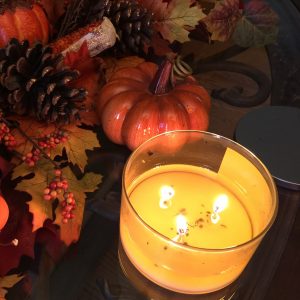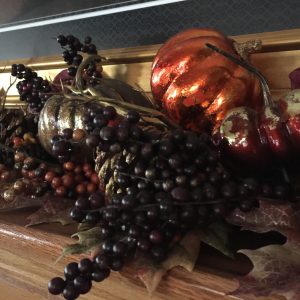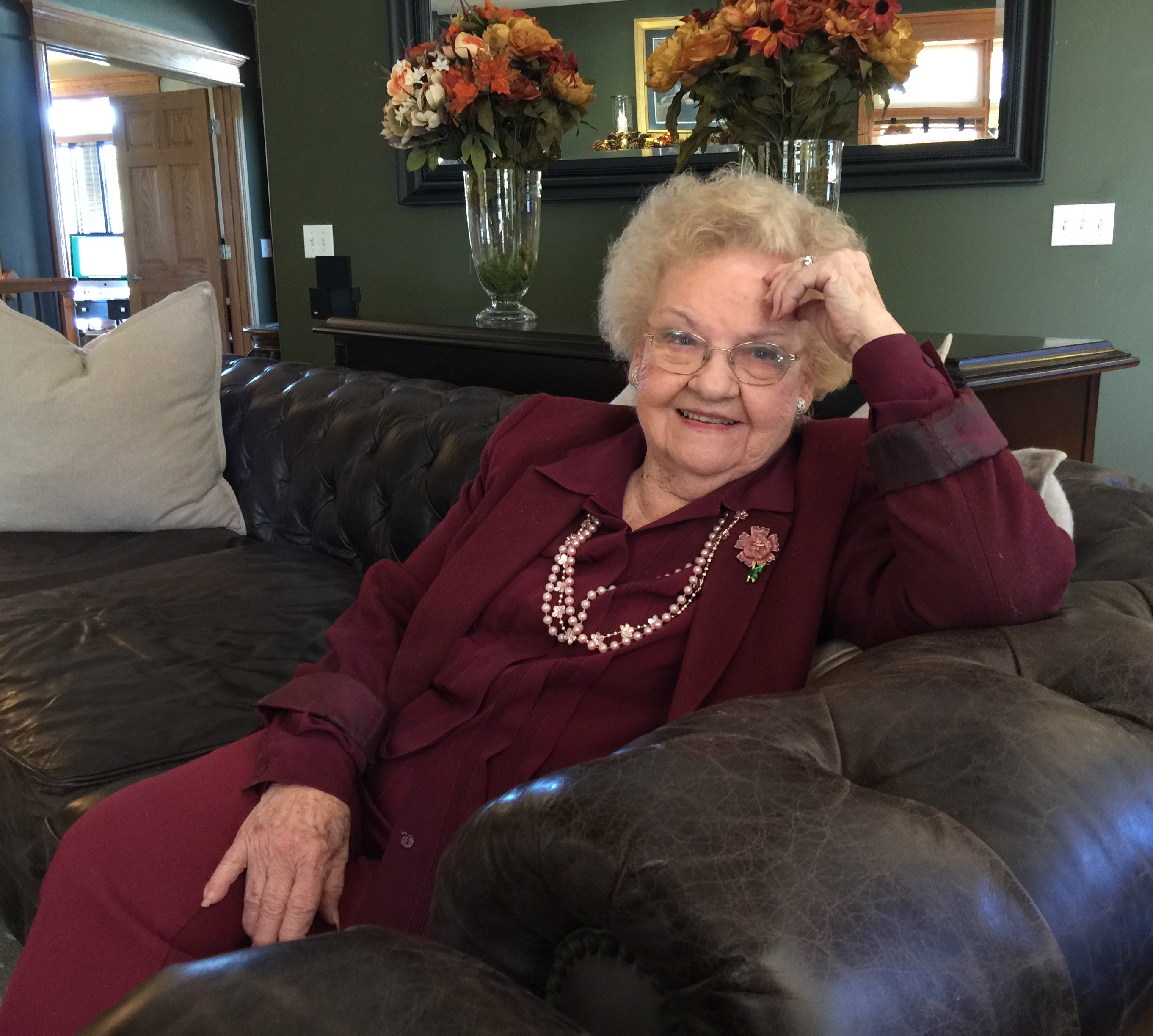Epiphany Moments that Change Your Worldview
Recently, Aaron and I were home on what turned out to be a beautiful, autumn day. The skies were clear and sunlight was streaming in through the windows. Our fall decorations, brought out of storage and restored to their seasonal place, adorned the woodwork. A pot of hot, fresh coffee had been brewed. The fireplace was burning. There were candles lit, their fragrances filling the air – one tobacco leaf and sage, the other a mixture of spices.
It was one of those days that filled you with wonder; where you look around and feel a sense of amazement and gratitude that you have been given the gift of being alive right then, right there; that no matter what may come in the future, that moment cannot be taken away from you.
Making the day even more enjoyable, my grandmother and her significant other, Brian – a smart, ninety-something year old gentleman who treats her extraordinarily well – stopped by to visit us. (I call him her significant other because I’m not sure what the official title of their relationship is except to say that, were they not both closing in on the century-mark and not particularly keen on complicating their estates, it’s clear they would have been married awhile ago. They are very, very much in love. You can’t help but smile when you see how he fusses over her and how she beams at him.)
While Aaron and Brian were having a conversation out back overlooking the woods, Grandma and I were in the living room talking; Aaron and Brian later joined us. It’s always a joy and the conversations usually cover everything from politics and religion to business and cooking. This time around, I caught her up on what we were doing at Kennon-Green & Co. as we had been putting in a lot of 18+ hour days during the soft-launch to the information waiting list, which is still on-going. At one point, she began reflecting on her life – something she’s done more and more as she’s gotten older – and recounting something that she’s only shared a few times in the past. It’s a story that I sometimes find myself turning over in my mind and one that has risen to the surface quite a bit over the past week.
She was living in the tiny town of El Dorado Springs, Missouri; the same one where she grew up, where her father had run his Conoco service station. It was the town where she, as a little girl, remembers being in the yard when her Cousin Tommy, who was later killed in action, came outside and told her the Japanese had just bombed Pearl Harbor; the same town where she would become the first woman elected to the school board, start the sporting goods business that she helped build into something of value over her career; the same town that would shape me and several of my siblings in a lot of ways.
A group of students from the local high school were on a trip. During the journey, the bus crashed. It was horrific. In an age before cellular phones and major highways, there was no one to notify for help. By grace alone, as the children lay by the road some injured, some disfigured, and several dying, a miracle occurred when a black gospel choir that happened to be traveling through the area came upon the scene and took mercy. The singers rushed to save those they could; frantically piling bodies in and speeding to nearby Nevada, Missouri in a race against time. In doing so, they managed to change history. Through that singular act of kindness and bravery, that group of traveling musicians saved the lives of several boys and girls who otherwise would not have made it. Parents were spared the agony of having to bury their children. Friends were saved the devastation of having to attend funeral services for their classmates. Future spouses were given an opportunity to meet the person they would love and with whom they would spend their lives. Children and grandchildren were born that otherwise would not have existed.
A year later, the members of the choir were in the area and decided to return to El Dorado Springs to check on the children whose lives they had saved. Only, upon their arrival, they were not welcomed. They were given no thanks nor shown any hospitality. When my grandmother gets lost in remembering it, her eyes begin to water. Her voice breaks. Her eyes flash with a mixture of sadness and pain, anger and disbelief. “They wouldn’t even feed them …”, she says.
El Dorado Springs was effectively a Sundown Town. If you were a minority, particularly black, it was not wise to be caught in the city limits after dark. Even knowing this – it was simply how it was to a child growing up in the 1930s and 1940s – it never occurred to her that the men, women, families, and friends she saw be so kind in daily life could hate an entire group of people so much that they would turn away those who had saved their own children’s lives; that the bigotry in their hearts could have taken root so deeply that it overpowered all other circumstances or concerns. While almost everyone involved has since passed away, you can tell it still bothers her; the injustice of it. The small solace she takes, all these generations later and imperfect as it may be, is that the members of her church refused to accept this. They stepped in to welcome them and serve them; to repay kindness with kindness.
I find myself thinking about that story – about how a single moment, or series of moments related to a certain time, can be like turning on a light; when you look around you and everything is different. In this case, it was realizing that what had been passing itself off as morality was, in fact, profoundly immoral; how you, yourself, or other around you, can be almost blind to the consequences of your or their actions; incapable of empathy, putting yourself or themselves in another’s position. (I suspect that the reason this unwillingness arises, at least in some people, is that they don’t understand that understanding someone’s position isn’t the same as accepting it; that it is entirely justifiable to understand where someone is coming from and, yet, still reject the position provided you can do so based upon defensible logic and reasoning. It’s important that when doing so, you do it with your eyes fully open, aware that you’ve made a conscious choice and avoiding the temptation to deny the way you’ve acted in order to preserve some ideal image of yourself.)
Epiphany moments are a real phenomenon; a powerful neurological event that can reshape your life. They can be profound or observational, humorous or heartbreaking. Some are personal. Some are professional. Some are academic. Some are scientific. Some are generational. While they seem to come more often to those who dedicate time to think, or who are naturally introspective, they aren’t necessarily limited to such people. They can be earned through the acquisition of knowledge. They can be uncovered by ceaseless toil toward a specific end though, in those cases, they strangely seem to arrive when you’ve stepped away from the problem and are thinking about something else, giving your subconscious time to process information. Sometimes, they can seem like common sense to other people but represent a radical reorientation to the person who has had the experience.
I love hearing about people’s epiphany moments because it gives you insight into who they are and how they are wired. An example is actor Dustin Hoffman who has talked a few times over the years about breaking down in tears during a private conversation with his wife after doing a makeup test for the movie Tootsie, the Academy Award-nominated 1982 comedy in which he co-stared with Jessica Lang (she won an Oscar for the role), Bill Murray, Gena Davis, and a host of others well-known actors and actresses. In the film, Hoffman was going to play an out-of-work actor who can’t get hired because he has a reputation for being difficult. To land a job, he concocts this hairball scheme to dress up as a woman so casting agents don’t know it’s him. His creation, Dorothy Michaels, ends up becoming one of the biggest stars on a daytime soap opera and he has to juggle this double-life without many people knowing. He said that he thought of himself as an interesting person; a person you’d want to get to know and with whom you’d want to have discussions. Yet, when he saw himself in costume, he realized that he never would have approached a woman who looked like he did because there was no physical attraction. He realized how many conversations and experiences he had robbed himself of over the years because of that prejudice; how many interesting women he could have gotten to know as people but that he never gave a second glance because they weren’t what he considered to be pretty.
Here’s a video of him talking about it. It’s worth watching.
I think it’s a good practice to catalog them, reminding yourself from time to time. Personally, I can count roughly a dozen epiphany moments that changed the course of my life. I can tell you where I was when each occurred and what was happening at the time. Each was a gift for which I remain grateful, even when I didn’t like what was revealed. The most recent occurred during election season this year when I witnessed certain behaviors that fundamentally changed both my worldview and my understanding of how people operate within complex systems. It solidified some theories that had been quietly formulating in my mind for the past few years; suspicions that I held but wouldn’t fully embrace until further evidence existed.
What are your epiphany moments? What insights did you get and how did it change your life?












